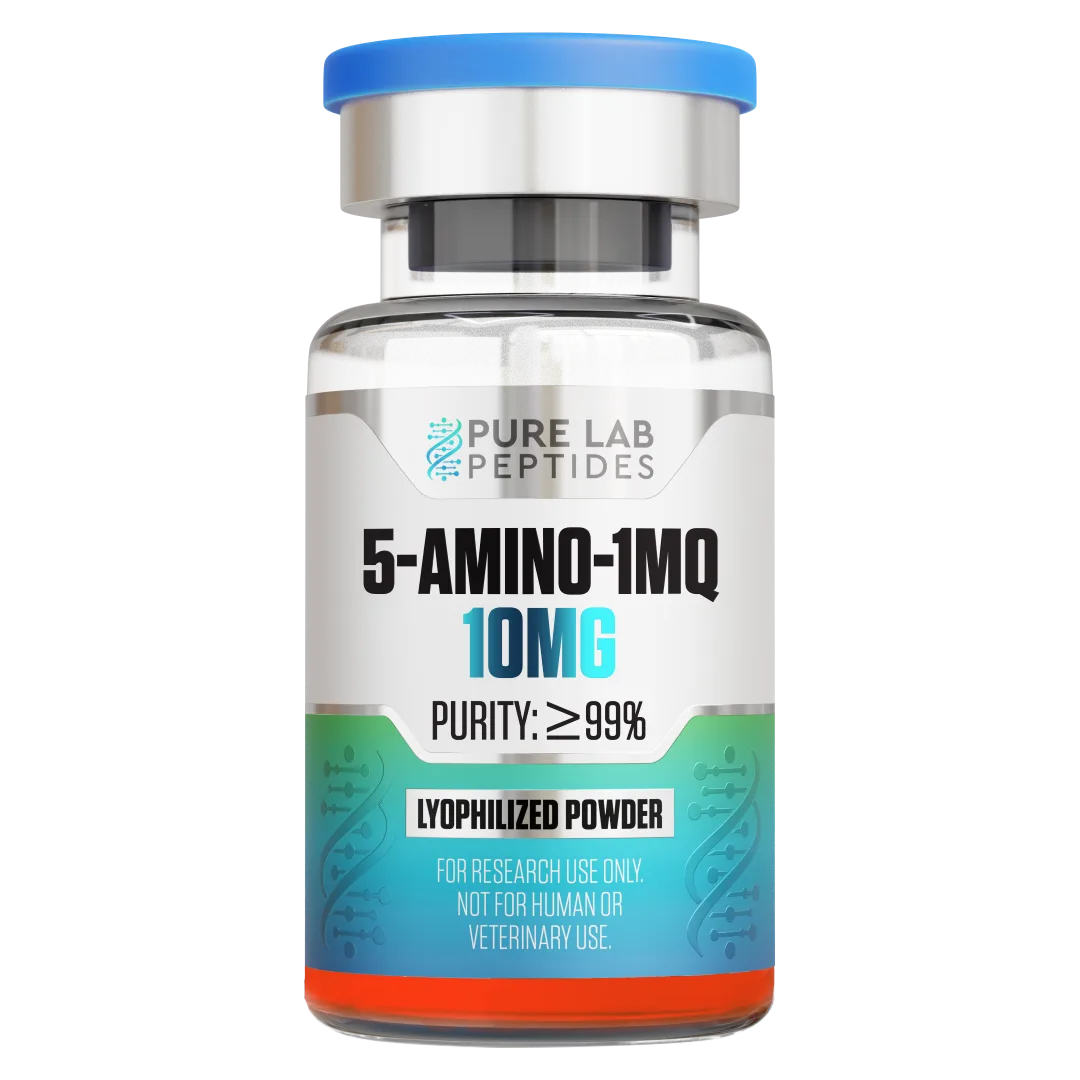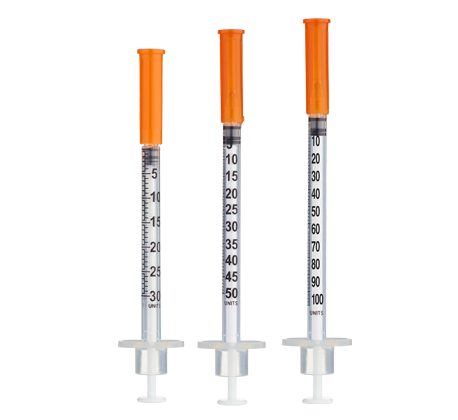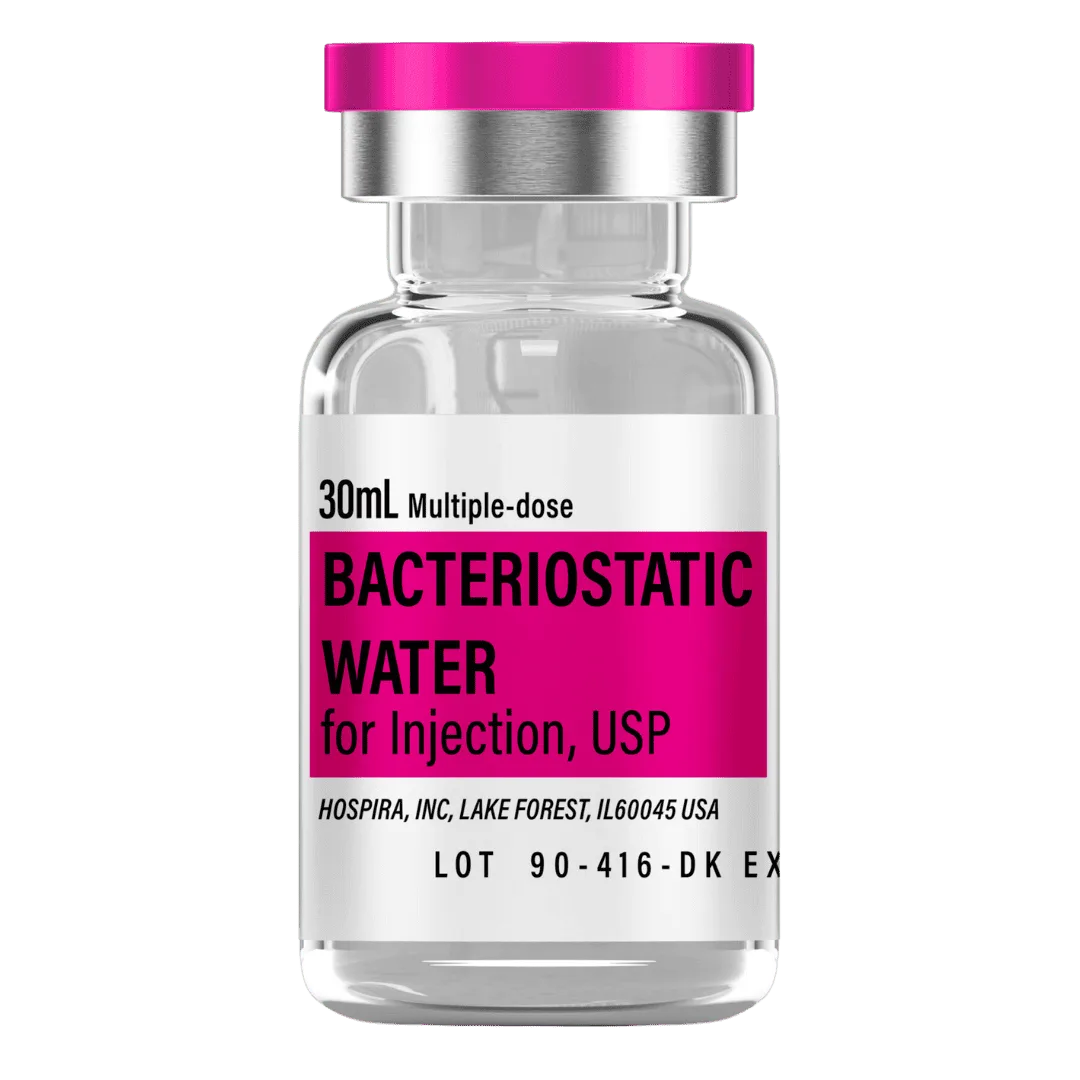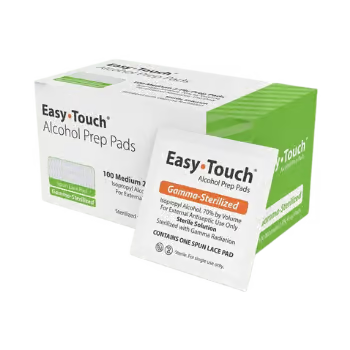5-Amino-1MQ (10 mg Vial) Dosage Protocol
Quickstart Highlights
5-Amino-1MQ dosage protocols center on this selective, cell-permeable NNMT (Nicotinamide N-methyltransferase) inhibitor studied for its potential to support fat metabolism, preserve lean muscle mass, and elevate intracellular NAD+ levels[1][2]. By blocking NNMT, 5-Amino-1MQ may help restore cellular energy balance and activate SIRT1 pathways associated with metabolic efficiency[3]. This educational protocol presents a subcutaneous injection approach to maximize bioavailability from the limited 10 mg vial format.
- Reconstitute: Add 2.0 mL bacteriostatic water → 5 mg/mL concentration.
- Typical daily range: 2.5–5 mg once or twice daily (subcutaneous).
- Easy measuring: At 5 mg/mL, 1 unit = 0.01 mL = 50 mcg on a U-100 insulin syringe.
- Storage: Lyophilized: freeze at −20 °C (−4 °F); after reconstitution, refrigerate at 2–8 °C (35.6–46.4 °F) and use within 2–4 weeks.

Dosing & Reconstitution Guide
Educational guide for reconstitution and daily dosing
Subcutaneous Protocol (2 mL = 5 mg/mL)
| Phase | Daily Dose (mg) | Units (per injection) (mL) |
|---|---|---|
| Days 1–2 (Tolerance) | 2.5 mg once daily | 50 units (0.50 mL) |
| Days 3–4 (Standard) | 5 mg once daily | 100 units (1.0 mL) |
| Alternative BID | 2.5 mg twice daily | 50 units (0.50 mL) × 2 |
Frequency: Inject once or twice daily subcutaneously. Due to the compound’s plasma half-life of approximately 3.8–6.9 hours[4], twice-daily (BID) dosing may provide more sustained NNMT inhibition. Note: A single 10 mg vial provides only 2–4 days of research material at these doses.
Reconstitution Steps
- Remove the vial from freezer storage (−20 °C / −4 °F) and allow to equilibrate at room temperature for 15–20 minutes.
- Draw 2.0 mL bacteriostatic water with a sterile syringe.
- Inject slowly down the vial wall; avoid foaming.
- Gently swirl/roll until dissolved—solution should be clear (do not shake).
- Label and refrigerate at 2–8 °C (35.6–46.4 °F), protected from light; use within 2–4 weeks.
Supplies Needed
Plan based on research duration. Due to the 10 mg vial format, extended protocols require multiple vials.
-
5-Amino-1MQ Vials (10 mg each):
- 1 week (5 mg/day) ≈ 4 vials
- 2 weeks (5 mg/day) ≈ 7 vials
- 4 weeks (5 mg/day) ≈ 14 vials
-
Insulin Syringes (U-100, 1 mL):
- Per week (once daily): 7 syringes
- Per week (BID): 14 syringes
- 4 weeks (once daily): 28 syringes
-
Bacteriostatic Water (10 mL bottles): Use 2.0 mL per vial for reconstitution.
- 1 week (4 vials): 8 mL → 1 × 10 mL bottle
- 2 weeks (7 vials): 14 mL → 2 × 10 mL bottles
- 4 weeks (14 vials): 28 mL → 3 × 10 mL bottles
-
Alcohol Swabs: One for the vial stopper + one for the injection site each administration.
- Per week (once daily): 14 swabs
- 4 weeks (once daily): 56 swabs → recommend 1 × 100-count box
Protocol Overview
Concise summary of the subcutaneous regimen.
- Goal: Support metabolic efficiency through NNMT inhibition, potentially enhancing fat oxidation and NAD+ levels[1][2].
- Schedule: Daily subcutaneous injections; vial provides 2–4 days of research material.
- Dose Range: 2.5–5 mg once or twice daily.
- Reconstitution: 2.0 mL per 10 mg vial (5 mg/mL) for accurate measurements.
- Storage: Lyophilized frozen at −20 °C (−4 °F); reconstituted refrigerated at 2–8 °C (35.6–46.4 °F).
Dosing Protocol
Suggested approach for the 10 mg vial format.
- Start: 2.5 mg once daily to assess tolerance.
- Target: 5 mg once daily or 2.5 mg twice daily (BID).
- Frequency: Once or twice per day (subcutaneous).
- Vial Duration: Single 10 mg vial lasts 2–4 days at research doses.
- Timing: Morning administration preferred; BID dosing may be split AM/PM.
Storage Instructions
Proper storage preserves compound stability.
- Lyophilized: Store at −20 °C (−4 °F) in dry, dark conditions; stable up to 24 months.
- Reconstituted: Refrigerate at 2–8 °C (35.6–46.4 °F); use within 2–4 weeks.
- Allow vials to reach room temperature before reconstitution to prevent condensation and pressure issues.
- Do not refreeze reconstituted solution.
Important Notes
Practical considerations for consistency and safety.
- Use new sterile insulin syringes for each administration; dispose in a sharps container.
- Rotate injection sites (abdomen, thighs, upper arms) to reduce local irritation.
- Inject slowly; a mild stinging sensation may occur due to the quinolinium structure.
- Document daily dose and site rotation to maintain consistency.
- The 10 mg vial format is suited for short-term tolerance assessment; extended protocols require multiple vials.
How This Works
5-Amino-1MQ (5-amino-1-methylquinolinium) is a synthetic small molecule that selectively inhibits Nicotinamide N-methyltransferase (NNMT)[1]. NNMT is an enzyme that methylates nicotinamide (vitamin B3) using S-adenosylmethionine (SAM) as a methyl donor. In states of obesity and metabolic dysfunction, NNMT is often overexpressed in adipose tissue, depleting nicotinamide and reducing NAD+ availability[2].
By inhibiting NNMT, 5-Amino-1MQ may spare nicotinamide for NAD+ synthesis, thereby activating SIRT1 (Sirtuin 1) pathways associated with mitochondrial biogenesis and fat oxidation[3]. Preclinical studies indicate that NNMT knockdown or inhibition can protect against diet-induced weight gain and improve metabolic parameters without reducing food intake[5][6].
Potential Benefits & Side Effects
Observations from preclinical and early research literature.
- May support reductions in fat mass while preserving lean muscle in animal models[5][6].
- Associated with elevated NAD+ levels and SIRT1 activation in preclinical studies[2][3].
- Enhanced grip strength observed in aged mice when combined with exercise[7].
- Generally well tolerated; occasional reports of mild headache, transient jitteriness, or injection-site reactions.
- Long-term human safety data not established; this compound remains investigational.
Lifestyle Factors
Complementary strategies for best outcomes.
- Pair with a balanced, protein-forward diet tailored to energy needs.
- Combine resistance training and aerobic activity—preclinical data suggest synergy with exercise[7].
- Prioritize sleep and stress management to support metabolic adaptation.
- Consider complementary NAD+ precursors (NMN/NR) per emerging stack protocols[8].
Injection Technique
General subcutaneous guidance from clinical best-practice resources[9].
- Clean the vial stopper and skin with alcohol; allow to dry.
- Pinch a skinfold; insert the needle at 45–90° into subcutaneous tissue[10][11].
- Do not aspirate for subcutaneous injections; inject slowly and steadily[10].
- Rotate sites systematically (abdomen, thighs, upper arms) to avoid lipohypertrophy[12].
- Slow injection may minimize any stinging sensation associated with the compound.
Recommended Source
We recommend Pure Lab Peptides for high-purity 5-Amino-1MQ (10 mg).
Why Pure Lab Peptides?
- High-purity (≥99% HPLC), third-party-tested lots with batch COAs.
- Consistent, ISO-aligned handling and documentation.
- Reliable fulfillment to maintain cold-chain integrity.
Important Note
This content is intended for therapeutic educational purposes only and does not constitute medical advice, diagnosis, or treatment.
References
-
Nature Medicine (2014)
— Nicotinamide N-methyltransferase knockdown protects against diet-induced obesity -
PMC (2024)
— Nicotinamide N-methyltransferase inhibition mitigates obesity-related metabolic dysfunctions -
Frontiers in Pharmacology (2024)
— NNMT: a novel therapeutic target for metabolic syndrome -
PubMed (2021)
— LC-MS/MS assay for 5-amino-1-methylquinolinium: pharmacokinetic and oral bioavailability study -
ResearchGate (2021)
— Combined NNMT inhibition and reduced-calorie diet normalizes body composition in obese mice -
PMC (2022)
— Reduced calorie diet combined with NNMT inhibition establishes a distinct microbiome in DIO mice -
NMN.com / Scientific Reports
— Role of NNMT inhibition in muscle strength: enhanced grip strength with exercise -
Swolverine
— 5-Amino-1MQ mechanism, benefits, stacking and cycling guide -
PMC
— Subcutaneous drug injection review: pharmacologic considerations -
CDC
— Vaccine administration: subcutaneous route (angle/site; no aspiration) -
CDC (Subcut Injection PDF)
— Technique diagram and site guidance for subcutaneous injections -
NCBI Bookshelf
— Best practices for injection (asepsis, preparation, and administration) -
Journal of Medicinal Chemistry (ACS)
— Bisubstrate inhibitors of NNMT with enhanced activity -
PMC
— NNMT: a bad actor in fat makes good in liver -
Pure Lab Peptides
— 5-Amino-1MQ (10 mg) product page (quality and batch documentation)



